Itinerary
Amsterdam combines the unrivaled beauty of the 17th-century Golden Age city center with plenty of museums and art of the highest order, not to mention a remarkably laid-back atmosphere. It all comes together to make this one of the world’s most appealing and offbeat metropolises in the world. Built on a latticework of concentric canals like an aquatic rainbow, Amsterdam is known as the City of Canals—but it’s no Venice, content to live on moonlight serenades and former glory. Quite the contrary: on nearly every street here you’ll find old and new side by side—quiet corners where time seems to be holding its breath next to streets like neon-lit Kalverstraat, and Red Light ladies strutting by the city’s oldest church. Indeed, Amsterdam has as many lovely facets as a 40-carat diamond polished by one of the city’s gem cutters. It’s certainly a metropolis, but a rather small and very accessible one. Locals tend to refer to it as a big village, albeit one that happens to pack the cultural wallop of a major world destination. There are scores of concerts every day, numerous museums, summertime festivals, and, of course, a legendary year-round party scene. It’s pretty much impossible to resist Amsterdam’s charms. With 7,000 registered monuments, most of which began as the residences and warehouses of humble merchants, set on 160 man-made canals, and traversed by 1,500 or so bridges, Amsterdam has the largest historical inner city in Europe. Its famous circle of waterways, the grachtengordel, was a 17th-century urban expansion plan for the rich and is a lasting testament to the city’s Golden Age. This town is endearing because of its kinder, gentler nature—but a reputation for championing sex, drugs, and rock ’n’ roll does not alone account for Amsterdam’s being one of the most popular destinations in Europe: consider that within a single square mile the city harbors some of the greatest achievements in Western art, from Rembrandt to Van Gogh. Not to mention that this is one of Europe’s great walking cities, with so many of its treasures in the untouted details: tiny alleyways barely visible on the map, hidden garden courtyards, shop windows, floating houseboats, hidden hofjes(courtyards with almshouses), sudden vistas of church spires, and gabled roofs that look like so many unframed paintings. And don’t forget that the joy lies in details: elaborate gables and witty gable stones denoting the trade of a previous owner. Keep in mind that those XXX symbols you see all over town are not a mark of the city’s triple-X reputation. They’re part of Amsterdam’s official coat of arms—three St. Andrew’s crosses, believed to represent the three dangers that have traditionally plagued the city: flood, fire, and pestilence. The coat’s motto (“Valiant, determined, compassionate”) was introduced in 1947 by Queen Wilhelmina in remembrance of the 1941 February Strike in Amsterdam—the first time in Europe that non-Jewish people protested against the persecution of Jews by the Nazi regime.
Day programme:
AMSTERDAM – EMBARKATION. Embark your ship in Amsterdam for your 7-night cruise. (D)
Amsterdam combines the unrivaled beauty of the 17th-century Golden Age city center with plenty of museums and art of the highest order, not to mention a remarkably laid-back atmosphere. It all comes together to make this one of the world’s most appealing and offbeat metropolises in the world. Built on a latticework of concentric canals like an aquatic rainbow, Amsterdam is known as the City of Canals—but it’s no Venice, content to live on moonlight serenades and former glory. Quite the contrary: on nearly every street here you’ll find old and new side by side—quiet corners where time seems to be holding its breath next to streets like neon-lit Kalverstraat, and Red Light ladies strutting by the city’s oldest church. Indeed, Amsterdam has as many lovely facets as a 40-carat diamond polished by one of the city’s gem cutters. It’s certainly a metropolis, but a rather small and very accessible one. Locals tend to refer to it as a big village, albeit one that happens to pack the cultural wallop of a major world destination. There are scores of concerts every day, numerous museums, summertime festivals, and, of course, a legendary year-round party scene. It’s pretty much impossible to resist Amsterdam’s charms. With 7,000 registered monuments, most of which began as the residences and warehouses of humble merchants, set on 160 man-made canals, and traversed by 1,500 or so bridges, Amsterdam has the largest historical inner city in Europe. Its famous circle of waterways, the grachtengordel, was a 17th-century urban expansion plan for the rich and is a lasting testament to the city’s Golden Age. This town is endearing because of its kinder, gentler nature—but a reputation for championing sex, drugs, and rock ’n’ roll does not alone account for Amsterdam’s being one of the most popular destinations in Europe: consider that within a single square mile the city harbors some of the greatest achievements in Western art, from Rembrandt to Van Gogh. Not to mention that this is one of Europe’s great walking cities, with so many of its treasures in the untouted details: tiny alleyways barely visible on the map, hidden garden courtyards, shop windows, floating houseboats, hidden hofjes(courtyards with almshouses), sudden vistas of church spires, and gabled roofs that look like so many unframed paintings. And don’t forget that the joy lies in details: elaborate gables and witty gable stones denoting the trade of a previous owner. Keep in mind that those XXX symbols you see all over town are not a mark of the city’s triple-X reputation. They’re part of Amsterdam’s official coat of arms—three St. Andrew’s crosses, believed to represent the three dangers that have traditionally plagued the city: flood, fire, and pestilence. The coat’s motto (“Valiant, determined, compassionate”) was introduced in 1947 by Queen Wilhelmina in remembrance of the 1941 February Strike in Amsterdam—the first time in Europe that non-Jewish people protested against the persecution of Jews by the Nazi regime.
Day programme:
AMSTERDAM – KAMPEN. Enjoy a scenic cruise through the IJsselmeer to Kampen. Venture to the charming, canal-laden village of Giethoorn, nicknamed the “Dutch Venice.” Capture wonderful photos of the picturesque thatched-roof farmhouses, which are seemingly lifted straight from the pages of a fairytale. In the afternoon, go for a guided bike ride through the Dutch countryside or visit Flevoland’s vibrant tulip fields. (B,L,D)
Day programme:
BRUINISSE. After enjoying a scenic cruise through the Delta, join a guided tour to the medieval harbor town of Zierikzee, brimming with delights, from its 16th-century stone-built Gravesteen to its lovely harborside shops and cafes. This excursion includes a photo stop at the Oosterschelde Kering, the largest storm surge barrier of the Delta Works. Alternatively, focus your tour on the history of the Delta Works at the Flood Museum. More than half of the Netherlands lies below sea level and the Delta Works were built to prevent a recurrence of the 1953 flood disaster. Prefer discovering Bruinisse on two wheels? Join our guide for an exhilarating bike tour. (B,L,D)
Day programme:
GHENT – BRUGES, BELGIUM. Admire Ghent’s canal-side architecture and some of its famous sights, including the Castle of the Counts and St. Bavo’s Cathedral and its Adoration of the Mystic Lamb. Those with a sweet tooth can visit a chocolate maker’s shop. After being greeted with a glass of champagne, a master chocolatier will brief you on the history of chocolate. You will also have the opportunity to taste different types of pralines – and try your hand at making your own. Alternatively, take a full-day tour of Bruges, one of the best-preserved medieval cities in Europe and a UNESCO World Heritage Site. Stroll through Grote Markt and Burg Square, visit the centuries-old Church of Our Lady with its prominent spire, and, if you choose, sample some of the local specialties, from Belgian fries to waffles to chocolate, before returning to the ship. (B,L,D)
Explore Antwerp, Belgium’s second city. Known for its diamond cutting industry, fashion and the many great artists that lived in its vicinity, Antwerp is a city focused on art and culture.
Day programme:
ANTWERP. Explore this trendy city on a walking tour where you’ll see Antwerp’s Steen Castle, Grote Market and Brabo Fountain, along with the UNESCO-designated Cathedral of Our Lady. For a more active exploration of the area, join a guided bike tour. Later in the afternoon, you have a choice of two excursions. Foodies will want to go on a culinary tour to indulge in chocolate, waffles and beer. Flower lovers and gardeners can roam through the Floralia, an annual spring flower show featuring approximately one million bulbs that are hand-planted each year by the castle staff. (B,L,D)
Rotterdam is a city that’s a long way removed from most people’s stereotypical notion of the Netherlands. There are few, if any, canals to be found here nor are there any quaint windmills. There is, however, a thriving modern city which is one of the busiest ports in the entire world.
Day programme:
ROTTERDAM, THE NETHERLANDS – KINDERDIJK. During the morning, you can go on a walking tour of Rotterdam, nicknamed the “Gateway to Europe,” and taste local specialties. Alternatively, go on an excursion to Delft, known as the home of the painter Johannes Vermeer, Delft Blue earthenware and the Royal House. While here, you’ll visit the Royal Delft Porcelain Factory and Museum. If you prefer a more active adventure, then go on a bike ride through Rotterdam and past some of its famous landmarks and architecture. In the afternoon, venture to the UNESCO World Heritage Site of Kinderdijk, a lovely village renowned for having the country’s greatest concentration of windmills, all dating from the 18th century. Visit a private windmill via electric boat. You may also pedal past the windmills from the seat of a bike. Or, if you wish to explore the history of US immigration, join us on an excursion that visits Delfshaven, where, on August 1, 1620, the Pilgrim fathers departed on their epic journey aboard the Speedwell, plus tour the FENIX Museum of Migration, a former harbor warehouse currently being transformed into this unique educational experience. (B,L,D)
Amsterdam combines the unrivaled beauty of the 17th-century Golden Age city center with plenty of museums and art of the highest order, not to mention a remarkably laid-back atmosphere. It all comes together to make this one of the world’s most appealing and offbeat metropolises in the world. Built on a latticework of concentric canals like an aquatic rainbow, Amsterdam is known as the City of Canals—but it’s no Venice, content to live on moonlight serenades and former glory. Quite the contrary: on nearly every street here you’ll find old and new side by side—quiet corners where time seems to be holding its breath next to streets like neon-lit Kalverstraat, and Red Light ladies strutting by the city’s oldest church. Indeed, Amsterdam has as many lovely facets as a 40-carat diamond polished by one of the city’s gem cutters. It’s certainly a metropolis, but a rather small and very accessible one. Locals tend to refer to it as a big village, albeit one that happens to pack the cultural wallop of a major world destination. There are scores of concerts every day, numerous museums, summertime festivals, and, of course, a legendary year-round party scene. It’s pretty much impossible to resist Amsterdam’s charms. With 7,000 registered monuments, most of which began as the residences and warehouses of humble merchants, set on 160 man-made canals, and traversed by 1,500 or so bridges, Amsterdam has the largest historical inner city in Europe. Its famous circle of waterways, the grachtengordel, was a 17th-century urban expansion plan for the rich and is a lasting testament to the city’s Golden Age. This town is endearing because of its kinder, gentler nature—but a reputation for championing sex, drugs, and rock ’n’ roll does not alone account for Amsterdam’s being one of the most popular destinations in Europe: consider that within a single square mile the city harbors some of the greatest achievements in Western art, from Rembrandt to Van Gogh. Not to mention that this is one of Europe’s great walking cities, with so many of its treasures in the untouted details: tiny alleyways barely visible on the map, hidden garden courtyards, shop windows, floating houseboats, hidden hofjes(courtyards with almshouses), sudden vistas of church spires, and gabled roofs that look like so many unframed paintings. And don’t forget that the joy lies in details: elaborate gables and witty gable stones denoting the trade of a previous owner. Keep in mind that those XXX symbols you see all over town are not a mark of the city’s triple-X reputation. They’re part of Amsterdam’s official coat of arms—three St. Andrew’s crosses, believed to represent the three dangers that have traditionally plagued the city: flood, fire, and pestilence. The coat’s motto (“Valiant, determined, compassionate”) was introduced in 1947 by Queen Wilhelmina in remembrance of the 1941 February Strike in Amsterdam—the first time in Europe that non-Jewish people protested against the persecution of Jews by the Nazi regime.
Day programme:
AMSTERDAM. Enjoy a morning of scenic cruising before venturing out in the afternoon on a smaller boat specially designed to glide beneath the many bridges of Amsterdam. Admire the city’s historic harbor and canals, where you’ll see beautiful homes lining the water and the fabled Skinny Bridge. Alternatively, marvel at one of the most impressive public gardens in the world, Keukenhof**, which presents a spectacular display of millions of flowering tulips spread out over 70 acres. Spend time ambling through this legendary garden, open only nine weeks a year and sometimes referred to as the “Garden of Europe.” (B,L,D) **Note: Included on most departures; An alternative tour will operate on sailings that visit Amsterdam outside of Keukenhof’s open dates.
Amsterdam combines the unrivaled beauty of the 17th-century Golden Age city center with plenty of museums and art of the highest order, not to mention a remarkably laid-back atmosphere. It all comes together to make this one of the world’s most appealing and offbeat metropolises in the world. Built on a latticework of concentric canals like an aquatic rainbow, Amsterdam is known as the City of Canals—but it’s no Venice, content to live on moonlight serenades and former glory. Quite the contrary: on nearly every street here you’ll find old and new side by side—quiet corners where time seems to be holding its breath next to streets like neon-lit Kalverstraat, and Red Light ladies strutting by the city’s oldest church. Indeed, Amsterdam has as many lovely facets as a 40-carat diamond polished by one of the city’s gem cutters. It’s certainly a metropolis, but a rather small and very accessible one. Locals tend to refer to it as a big village, albeit one that happens to pack the cultural wallop of a major world destination. There are scores of concerts every day, numerous museums, summertime festivals, and, of course, a legendary year-round party scene. It’s pretty much impossible to resist Amsterdam’s charms. With 7,000 registered monuments, most of which began as the residences and warehouses of humble merchants, set on 160 man-made canals, and traversed by 1,500 or so bridges, Amsterdam has the largest historical inner city in Europe. Its famous circle of waterways, the grachtengordel, was a 17th-century urban expansion plan for the rich and is a lasting testament to the city’s Golden Age. This town is endearing because of its kinder, gentler nature—but a reputation for championing sex, drugs, and rock ’n’ roll does not alone account for Amsterdam’s being one of the most popular destinations in Europe: consider that within a single square mile the city harbors some of the greatest achievements in Western art, from Rembrandt to Van Gogh. Not to mention that this is one of Europe’s great walking cities, with so many of its treasures in the untouted details: tiny alleyways barely visible on the map, hidden garden courtyards, shop windows, floating houseboats, hidden hofjes(courtyards with almshouses), sudden vistas of church spires, and gabled roofs that look like so many unframed paintings. And don’t forget that the joy lies in details: elaborate gables and witty gable stones denoting the trade of a previous owner. Keep in mind that those XXX symbols you see all over town are not a mark of the city’s triple-X reputation. They’re part of Amsterdam’s official coat of arms—three St. Andrew’s crosses, believed to represent the three dangers that have traditionally plagued the city: flood, fire, and pestilence. The coat’s motto (“Valiant, determined, compassionate”) was introduced in 1947 by Queen Wilhelmina in remembrance of the 1941 February Strike in Amsterdam—the first time in Europe that non-Jewish people protested against the persecution of Jews by the Nazi regime.
Day programme:
DISEMBARKATION – DEPART AMSTERDAM. Disembark the ship and prepare for your flight home. (B) (B,L,D) – Indicates Breakfast, Lunch, and Dinner are included on this day.
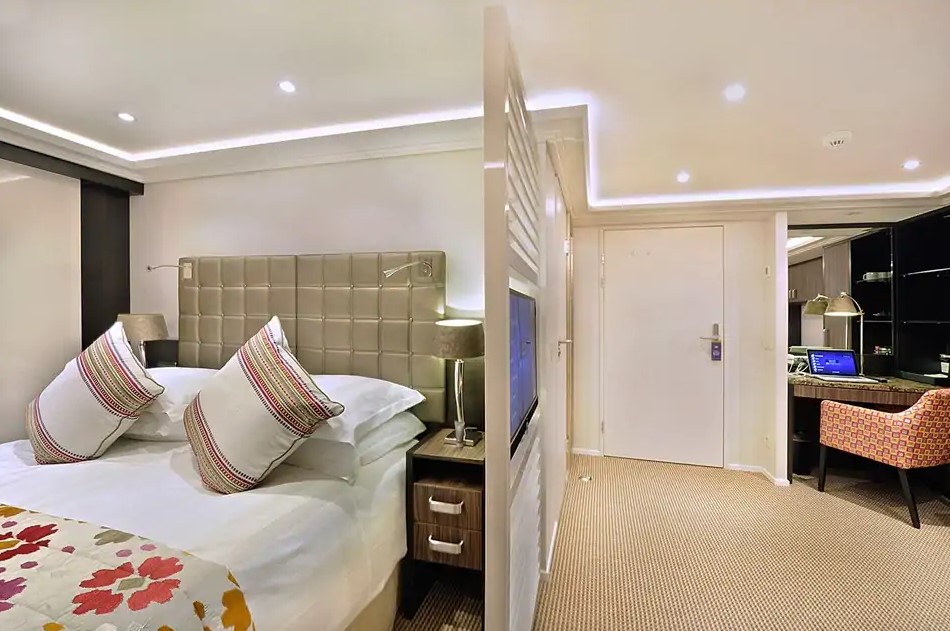
Suite Features Include:
- In-room temperature control
- Deluxe hotel-style bedding with Egyptian linen, down pillows and duvet
- Spacious bathrooms with multi-jet showerheads
- Large wardrobe, full-length mirror, hair dryer, safe and direct-dial telephone
- Flat-screen TV
- Entertainment on Demand system providing complimentary TV, movies and music library
- Complimentary internet and Wi-Fi
- Complimentary bottled water replenished daily
- Desk and chair
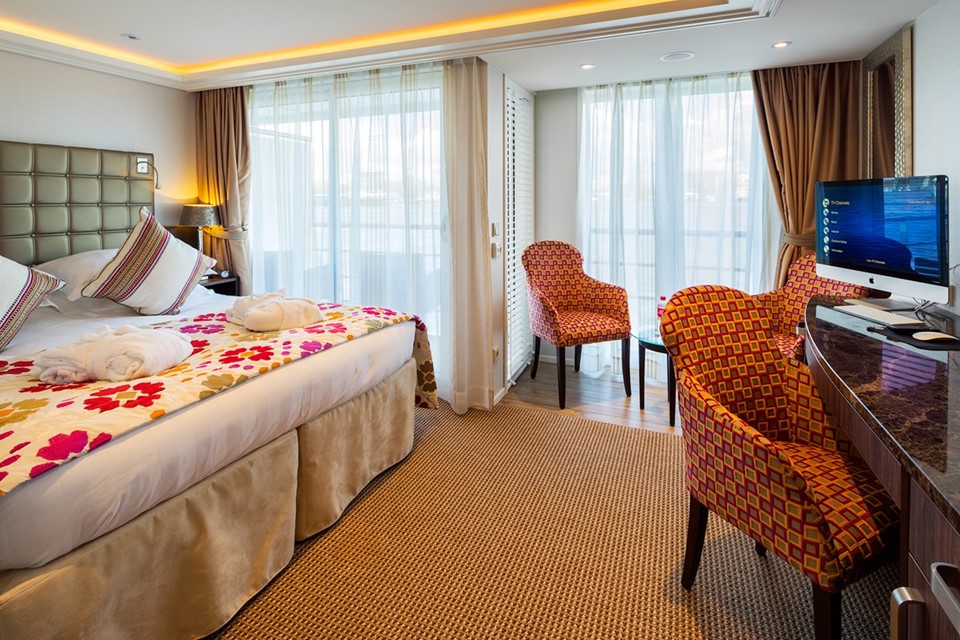
Stateroom Features Include:
- In-room temperature control
- Deluxe hotel-style bedding with Egyptian linen, down pillows and duvet
- Spacious bathrooms with multi-jet showerheads
- Large wardrobe, full-length mirror, hair dryer, safe and direct-dial telephone
- Flat-screen TV
- Entertainment on Demand system providing complimentary TV, movies and music library
- Complimentary internet and Wi-Fi
- Complimentary bottled water replenished daily
- Desk and chair
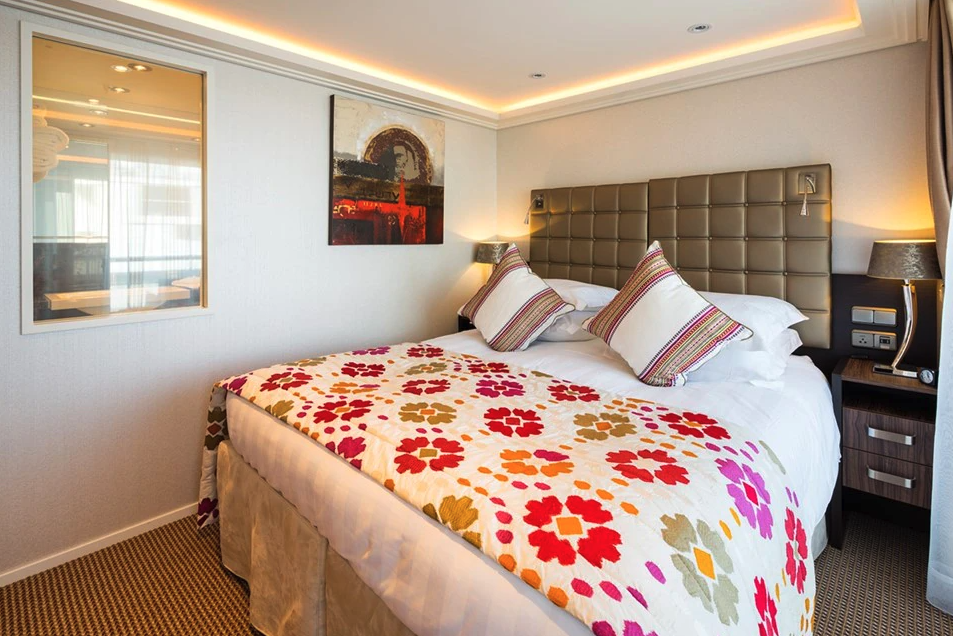
Stateroom Features Include:
- In-room temperature control
- Deluxe hotel-style bedding with Egyptian linen, down pillows and duvet
- Spacious bathrooms with multi-jet showerheads
- Large wardrobe, full-length mirror, hair dryer, safe and direct-dial telephone
- Flat-screen TV
- Entertainment on Demand system providing complimentary TV, movies and music library
- Complimentary internet and Wi-Fi
- Complimentary bottled water replenished daily
- Desk and chair
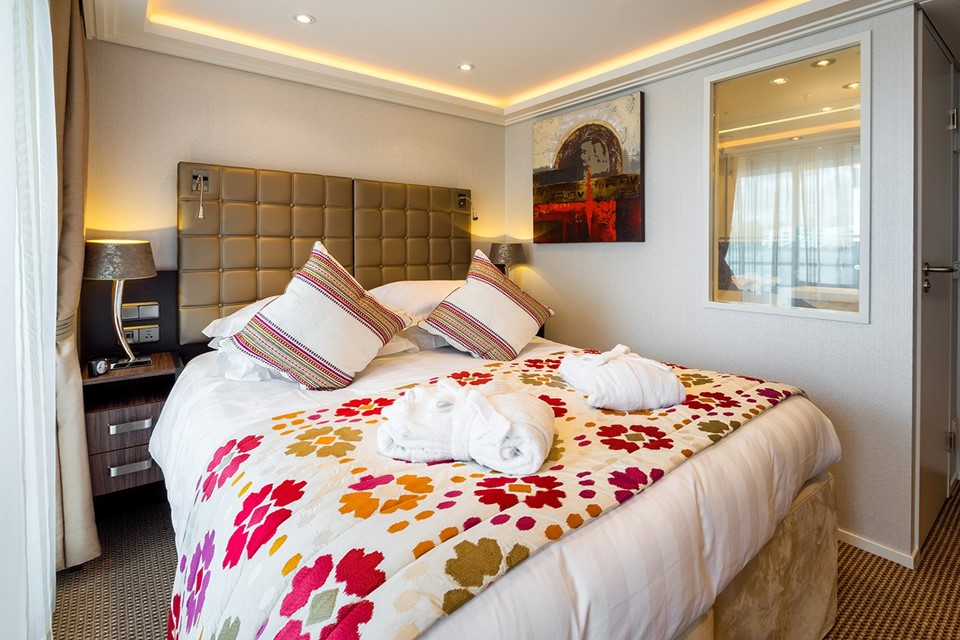
Stateroom Features Include:
- In-room temperature control
- Deluxe hotel-style bedding with Egyptian linen, down pillows and duvet
- Spacious bathrooms with multi-jet showerheads
- Large wardrobe, full-length mirror, hair dryer, safe and direct-dial telephone
- Flat-screen TV
- Entertainment on Demand system providing complimentary TV, movies and music library
- Complimentary internet and Wi-Fi
- Complimentary bottled water replenished daily
- Desk and chair
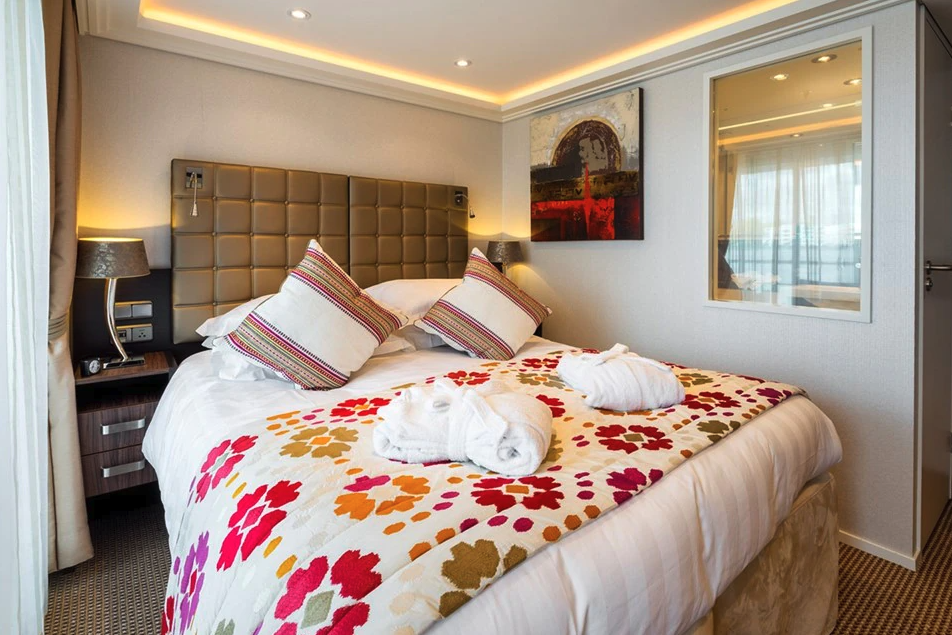
Stateroom Features Include:
- In-room temperature control
- Deluxe hotel-style bedding with Egyptian linen, down pillows and duvet
- Spacious bathrooms with multi-jet showerheads
- Large wardrobe, full-length mirror, hair dryer, safe and direct-dial telephone
- Flat-screen TV
- Entertainment on Demand system providing complimentary TV, movies and music library
- Complimentary internet and Wi-Fi
- Complimentary bottled water replenished daily
- Desk and chair
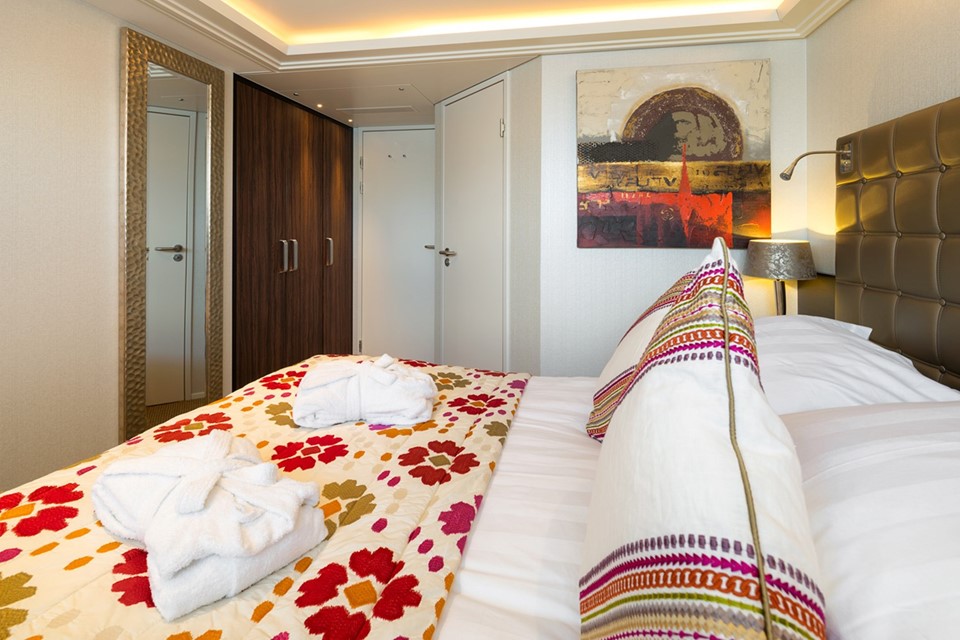
Stateroom Features Include:
- In-room temperature control
- Deluxe hotel-style bedding with Egyptian linen, down pillows and duvet
- Spacious bathrooms with multi-jet showerheads
- Large wardrobe, full-length mirror, hair dryer, safe and direct-dial telephone
- Flat-screen TV
- Entertainment on Demand system providing complimentary TV, movies and music library
- Complimentary internet and Wi-Fi
- Complimentary bottled water replenished daily
- Desk and chair
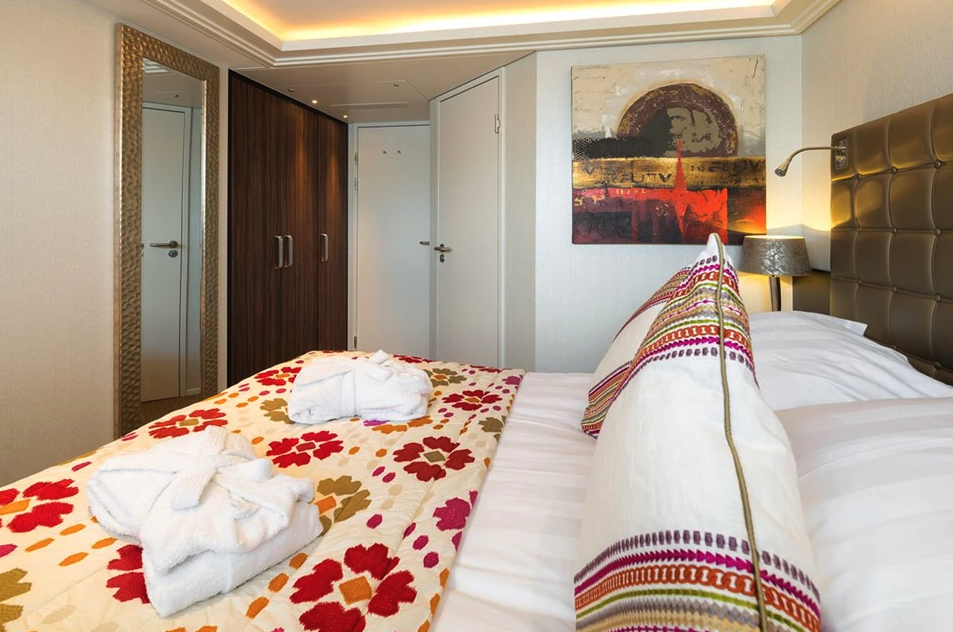
Stateroom Features Include:
- In-room temperature control
- Deluxe hotel-style bedding with Egyptian linen, down pillows and duvet
- Spacious bathrooms with multi-jet showerheads
- Large wardrobe, full-length mirror, hair dryer, safe and direct-dial telephone
- Flat-screen TV
- Entertainment on Demand system providing complimentary TV, movies and music library
- Complimentary internet and Wi-Fi
- Complimentary bottled water replenished daily
- Desk and chair
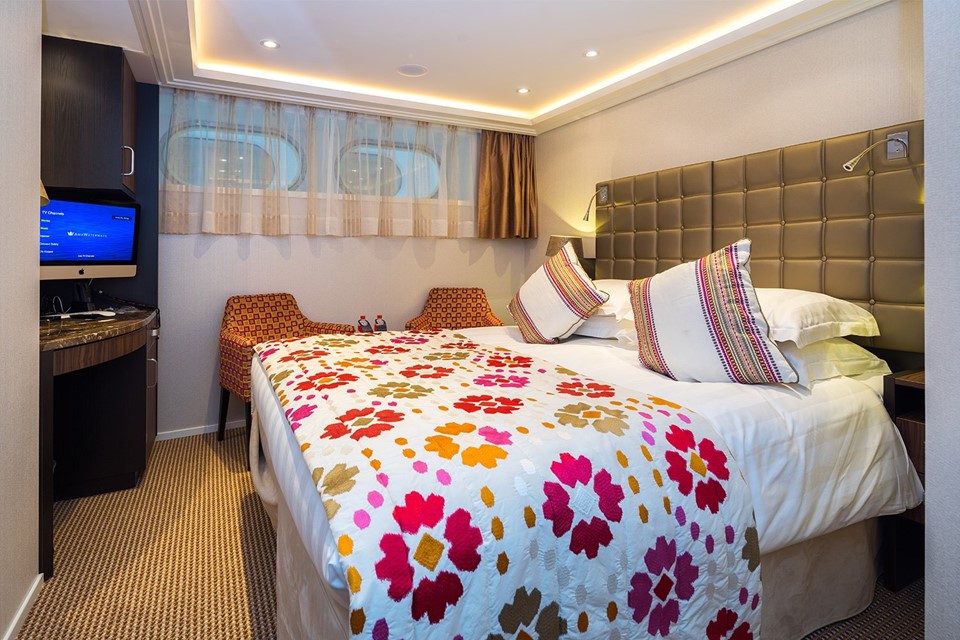
Stateroom Features Include:
- In-room temperature control
- Deluxe hotel-style bedding with Egyptian linen, down pillows and duvet
- Spacious bathrooms with multi-jet showerheads
- Large wardrobe, full-length mirror, hair dryer, safe and direct-dial telephone
- Flat-screen TV
- Entertainment on Demand system providing complimentary TV, movies and music library
- Complimentary internet and Wi-Fi
- Complimentary bottled water replenished daily
- Desk and chair
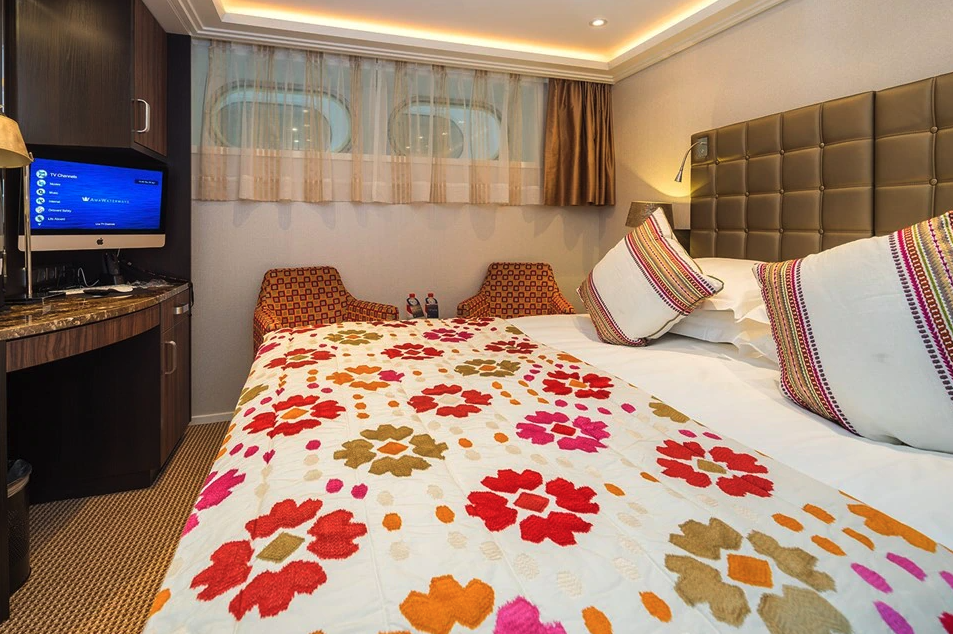
Stateroom Features Include:
- In-room temperature control
- Deluxe hotel-style bedding with Egyptian linen, down pillows and duvet
- Spacious bathrooms with multi-jet showerheads
- Large wardrobe, full-length mirror, hair dryer, safe and direct-dial telephone
- Flat-screen TV
- Entertainment on Demand system providing complimentary TV, movies and music library
- Complimentary internet and Wi-Fi
- Complimentary bottled water replenished daily
- Desk and chair
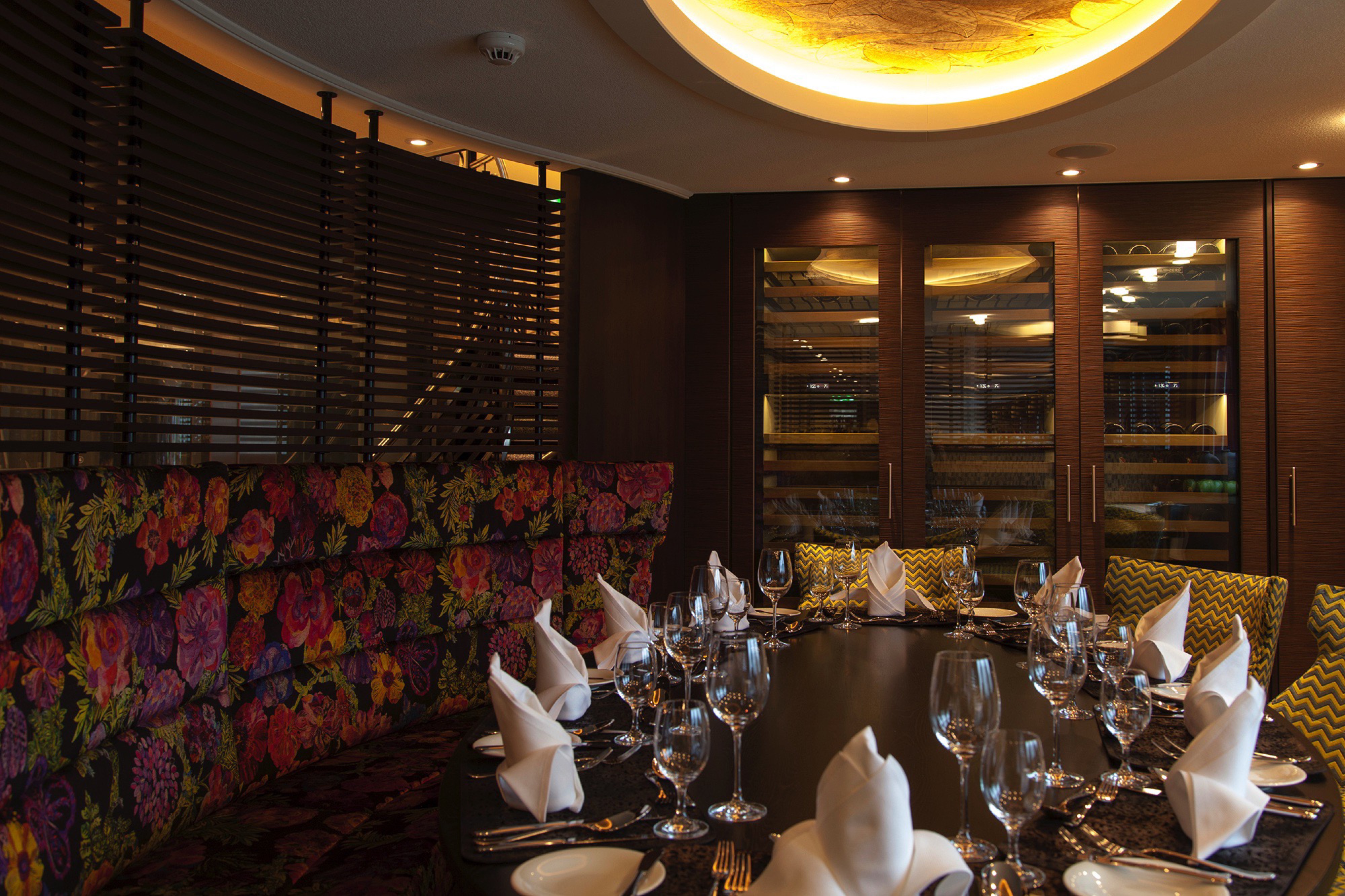
AmaWaterways’ expert chefs craft menus that feature exquisite, locally-inspired cuisine as well as traditional, Western offerings. At breakfast, sip sparkling wine as you partake fresh pastries, or opt for something made-to-order from the menu. Stop by the Main Lounge for a light lunch, or head to the restaurant for full menu service and high-quality regional wine or beer. Dinner is a delectable, multi-course affair with wine recommendations that accompany visually stunning, delicious dishes. Try local favourites — like goulash while cruising through Hungary, bratwurst and sauerkraut after returning to the ship from Vienna, or Camembert cheese while on the Seine — or something more familiar, like a sandwich. No matter what your preference, your taste buds are sure to be impressed.
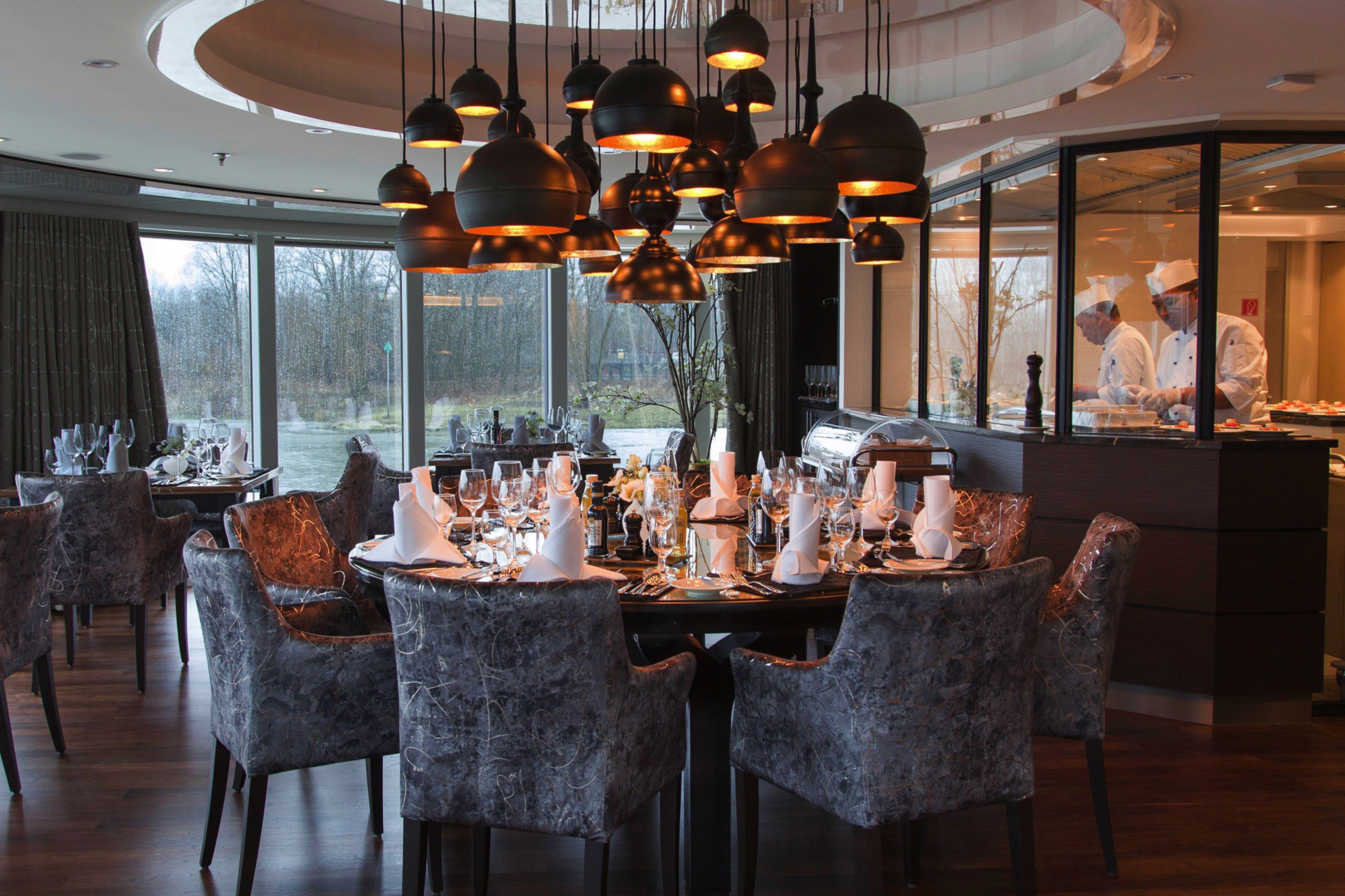
Join a few of your fellow travellers at The Chef’s Table, where the kitchen — usually hidden — becomes part of the entertainment. You’ll have the opportunity to watch the chef prepare a special multi-course meal right in front of you. The menu here is unique, making this a truly distinct gastronomic experience. Indulge in delectable dishes served with unlimited fine wines, hand-selected just for this dinner. It is the only venue of its kind on the river.
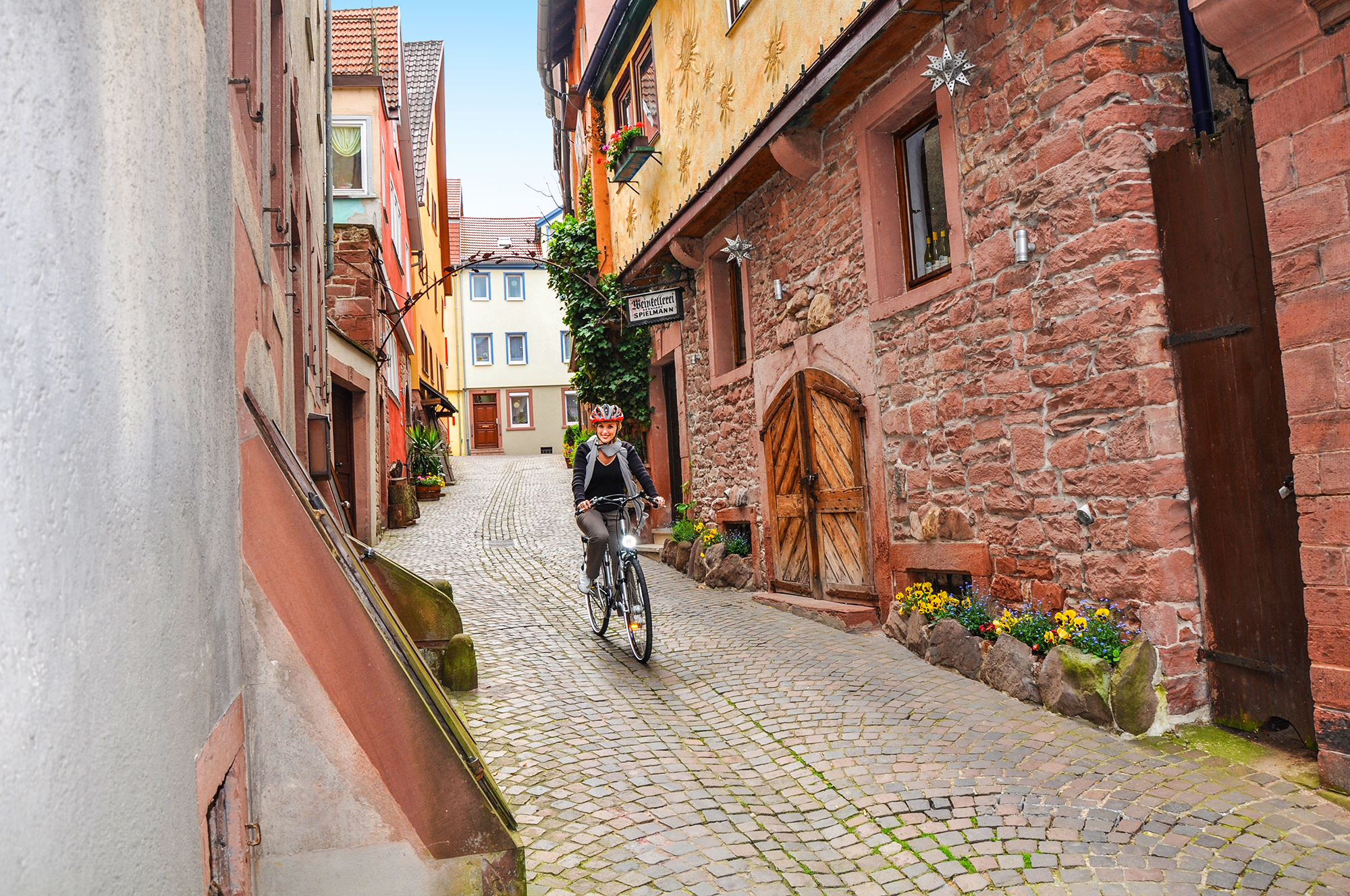
With AmaWaterways, you have the option of exploring Europe’s amazing sights like the locals do. We were the first river cruise line to carry an entire fleet of complimentary bicycles on board, so you can experience biking alongside enchanting riverside pathways and in city centres. Whether you feel like joining one of our exclusive guided bike tours, or want to go discover on your own, there are many ways for you to explore on two wheels during your cruise. Here are a few examples:
- Bike along the beautiful Danube River between Dürnstein and Melk in Austria’s Wachau Valley
- Tour Cologne’s Old Town and Cathedral along the Rhine River
- See the medieval city of Rouen in France’s historic Normandy region, near the Seine River
- Take in wooded hills and beaches of poplars along the scenic shores of the Inn River in Passau
- Go on a guided bike ride in Vienna, where you’ll visit Klosterneuberg Abbey and enjoy cake and coffee
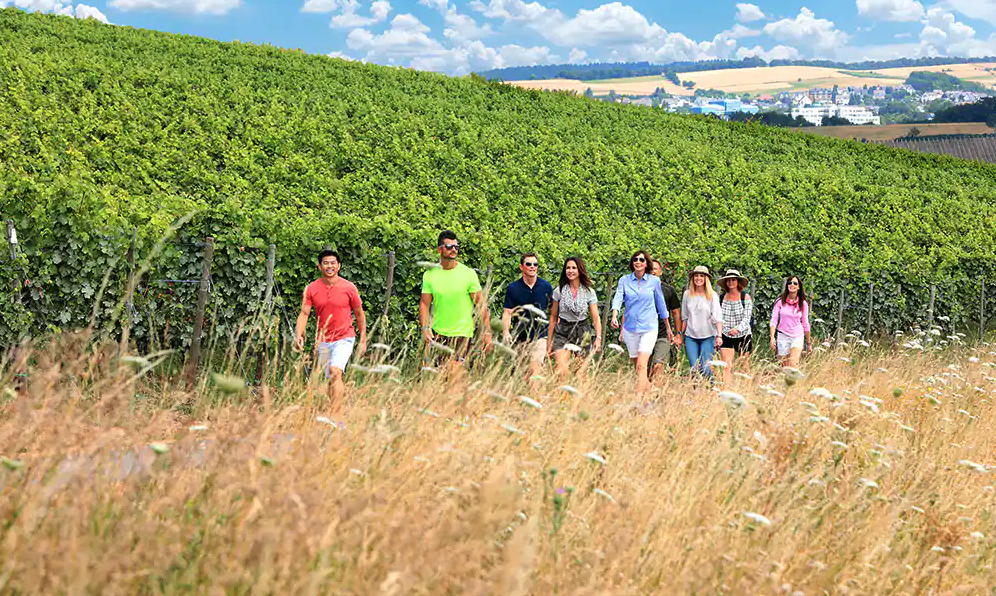
The beauty of Europe doesn’t just lie in its architecture and landmarks – there are also breath taking things to be seen when you venture out into nature. That’s why we’ve designed special hikes that will take you a bit off the beaten path in some very beautiful destinations.
- Trek up to the Veste Oberhaus in Passau, Germany for incredible views over Old Passau
- Make your way up to Dürnstein Fortress, where it is said that Richard the Lionheart was once held captive
- Hike up the Philosopher’s Path to a panoramic view of Heidelberg and the Necker River
- Journey from the ship to the Old Town in Strasbourg, France
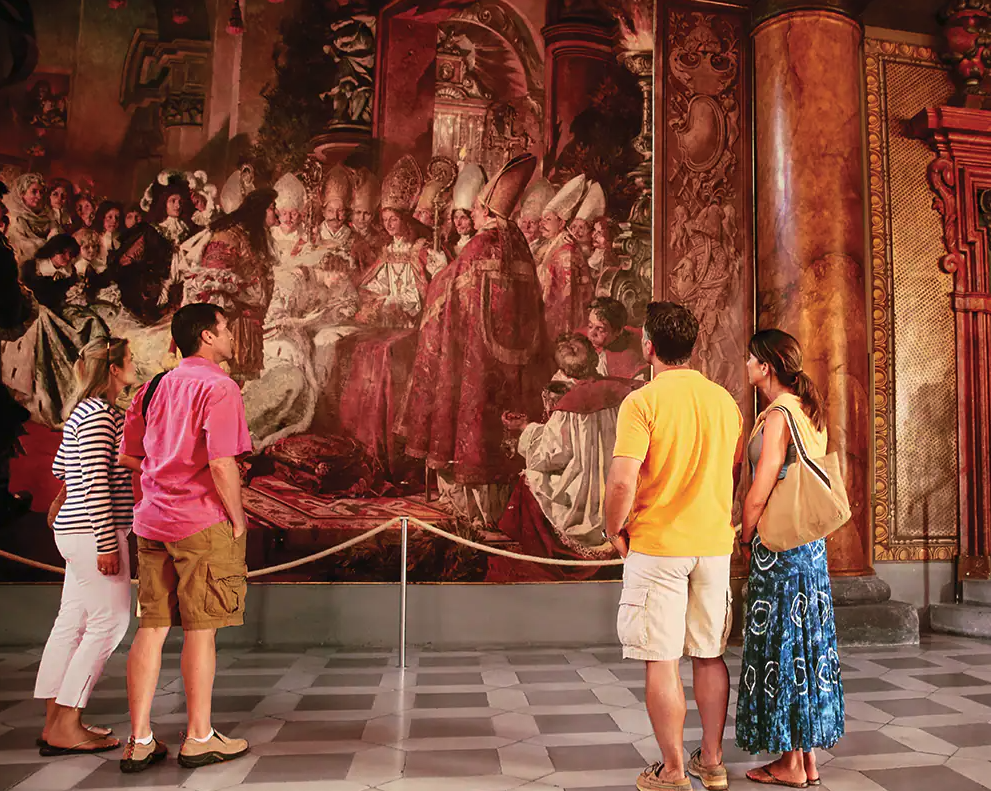
We realise that our guests have different tastes, so we’ve developed a menu of shore excursions in every port of call. In many destinations, you’ll be free to choose from one of several options — all of which are included in your cruise fare. There’s always a city tour designed to show you all the renowned highlights and landmarks in grand capitals and charming villages alike. Is it your first time in Vienna? Opt for an unforgettable exploration of the major sights led by a local, English-speaking guide that is well versed in history and culture. Have you already been to Nuremberg? Instead of taking the city tour, indulge in a bratwurst and beer tasting on one of our Special Interest Tours, which are specially designed to place you in the midst of local life. Are you looking for something more active? See the beautiful scenery of Austria’s Wachau Valley with a guided bike tour along the Danube. The choice is yours.

Every year, we seek out new opportunities for our guests to experience local culture in a unique way. These tours are specially designed to give small groups the chance to be even more immersed in a destination. Here are just a few examples:
- Indulge in authentic Belgian waffles and chocolate in Antwerp
- Try your hand at knotting a bretzel (German for “pretzel”) in Wertheim
- Go to a bratwurst and beer tasting at the oldest brewery in Nuremberg
- Discover hidden treasures on a tour of Vienna’s secret spots and sights
- Sample Bavarian specialties like pralines in Regensburg
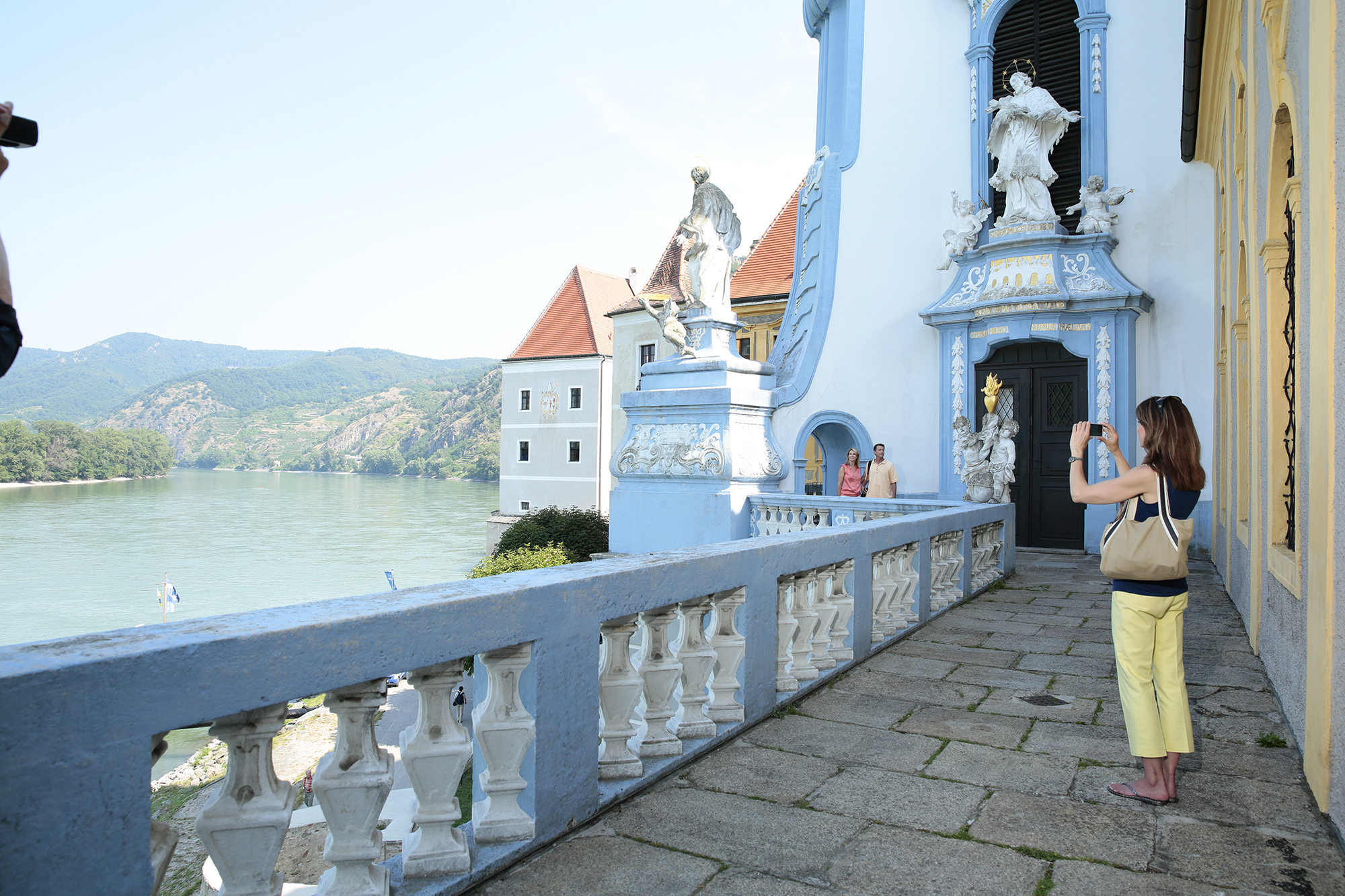
Make the most of your long-awaited vacation by adding our optional land packages before or after your sailing for an all-encompassing river cruise and land journey. Indulge your wanderlust and we’ll whisk you away between your ship and hotel, plus take you on specially curated guided tours with just the right amount of leisure time to explore the art, history or culinary delights in sought-after cities around the world.
Why Add a Land Package?
There are many benefits to adding a land package before or after your sailing. One of the simplest reasons is the convenience of making all your future travel plans in one step. Our concierge services allow you to reserve your river cruise, flights, airport transfers and land packages all at once. No need to call and research multiple providers – just contact your travel advisor and we’ll take care of it all. But the value of adding a land package doesn’t stop there.
World-Class Hotels
Whether you wish to rest and recover from flights or pamper yourself before returning home, you’ll find no better respite than the trusted, 4- and 5-star hotels we have carefully selected for you. Each luxurious property is centrally located near the major sights, such as Turkey’s Istanbul at Sultanahmet, just steps from the magnificent Blue Mosque. If you should wish to extend your vacation even further, your travel advisor can conveniently arrange extra hotel nights through AmaWaterways as well.
Our land packages include transfers between your hotel and river cruise ship, portage service and daily breakfast at the hotel. In addition, fascinating guided city tours and excursions are included, so you can:
- Discover breathtaking Mont St. Michel, France, the artistic inspiration for the movie Tangled
- Join a tasting of Czech beer while learning about the beverage’s long and illustrious history
- Visit Transylvania’s infamous Bran Castle, otherwise known as Dracula’s Castle
- Board a boat for a scenic ride along Italy’s Lake Como to the stunning lakeside village of Bellagio
- Rise with the sun at Cambodia’s UNESCO-designated Angkor Archaeological Complex
What’s Included in Your Land Package
- Overnight stays at 4- and 5-star hotels conveniently located near the major sites
- Daily breakfast at the hotel
- Guided city tours
- Convenient transfers to and from the ship
- The services of a professionally trained Cruise Manager throughout your river cruise and land stay – unique in the industry
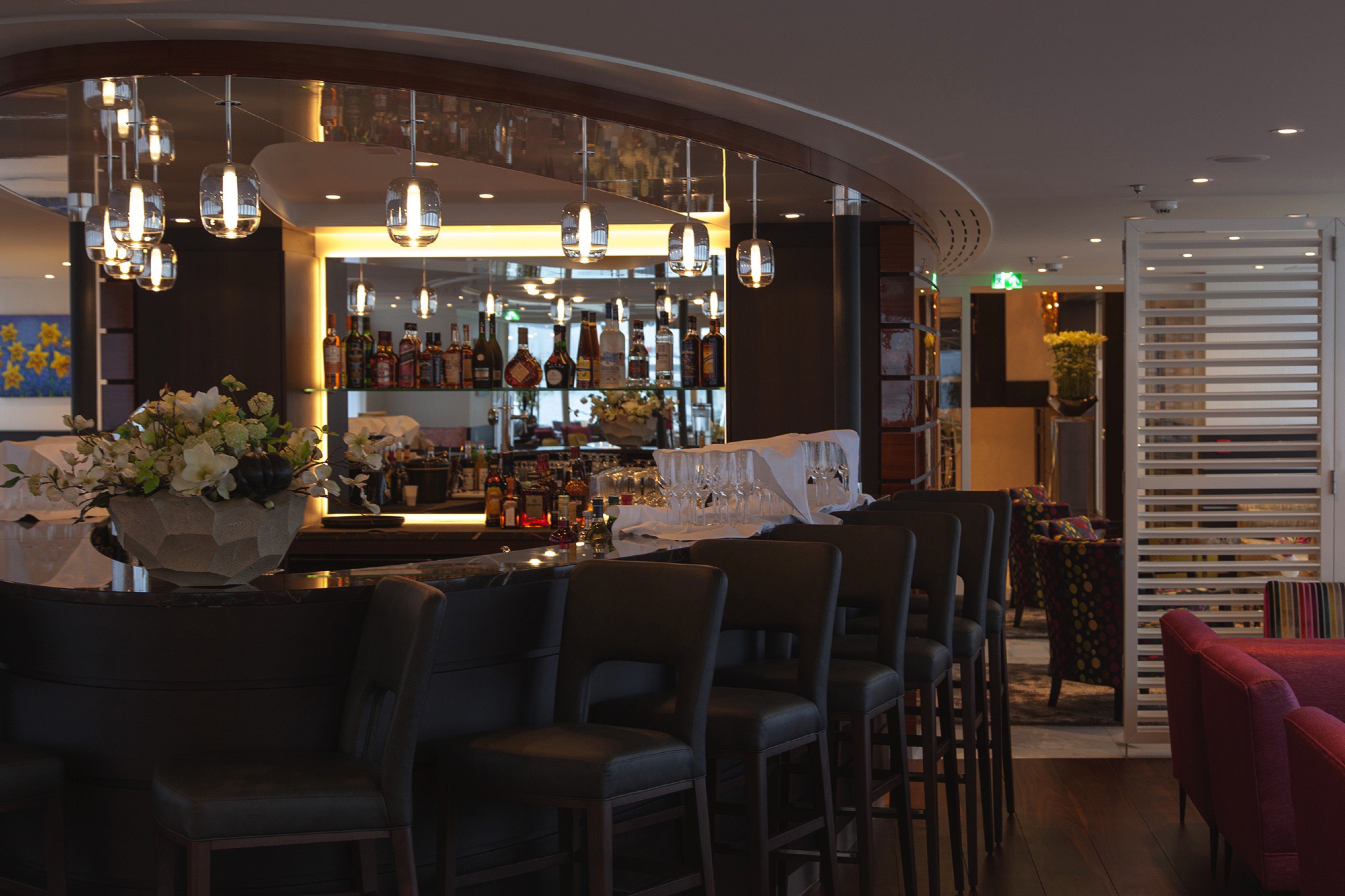
With fewer passengers on board, guests can enjoy the luxury of space — our public areas, like lounges and restaurants, are never overcrowded.
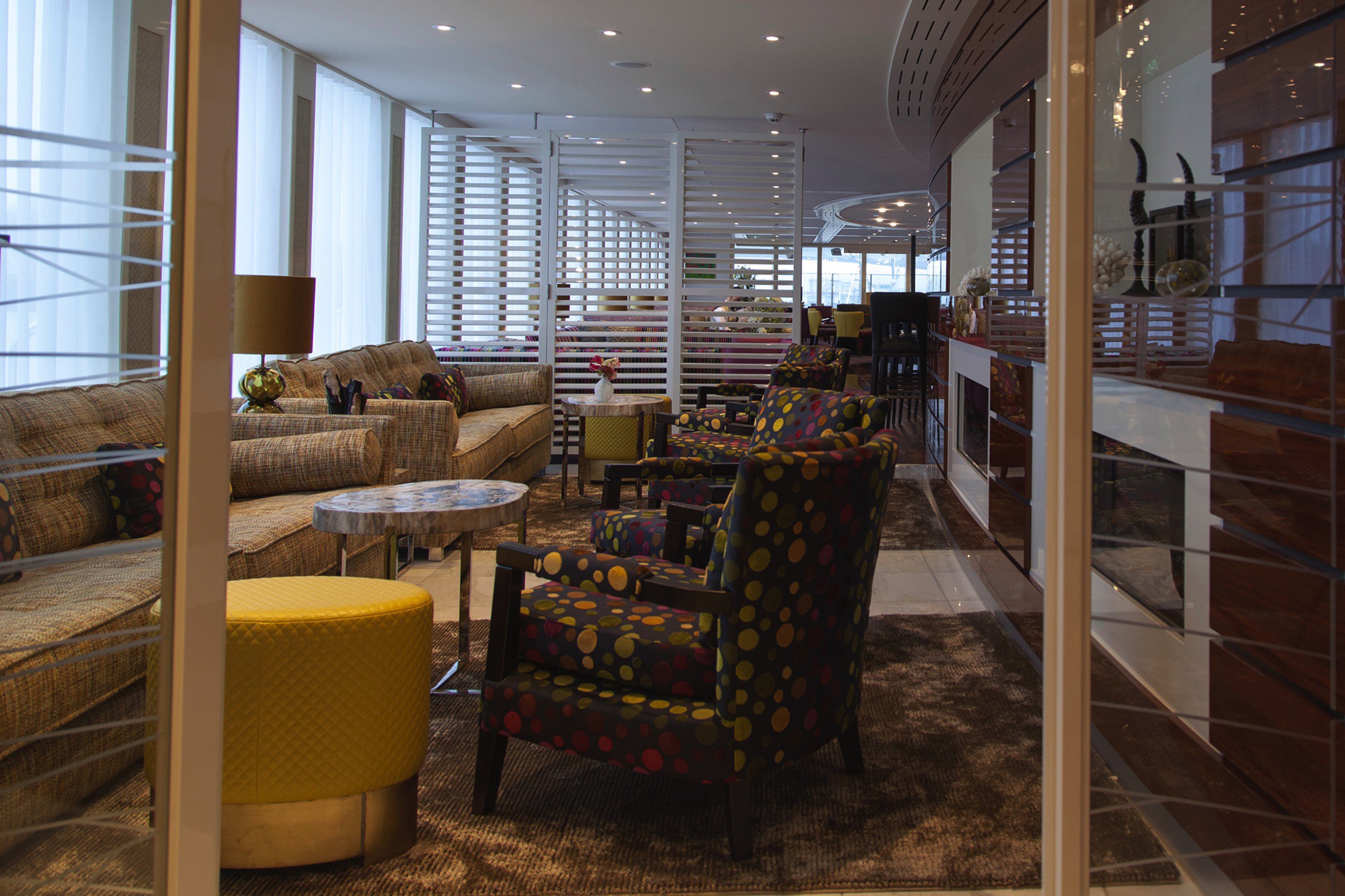
The Library can be found on the Violin Deck.
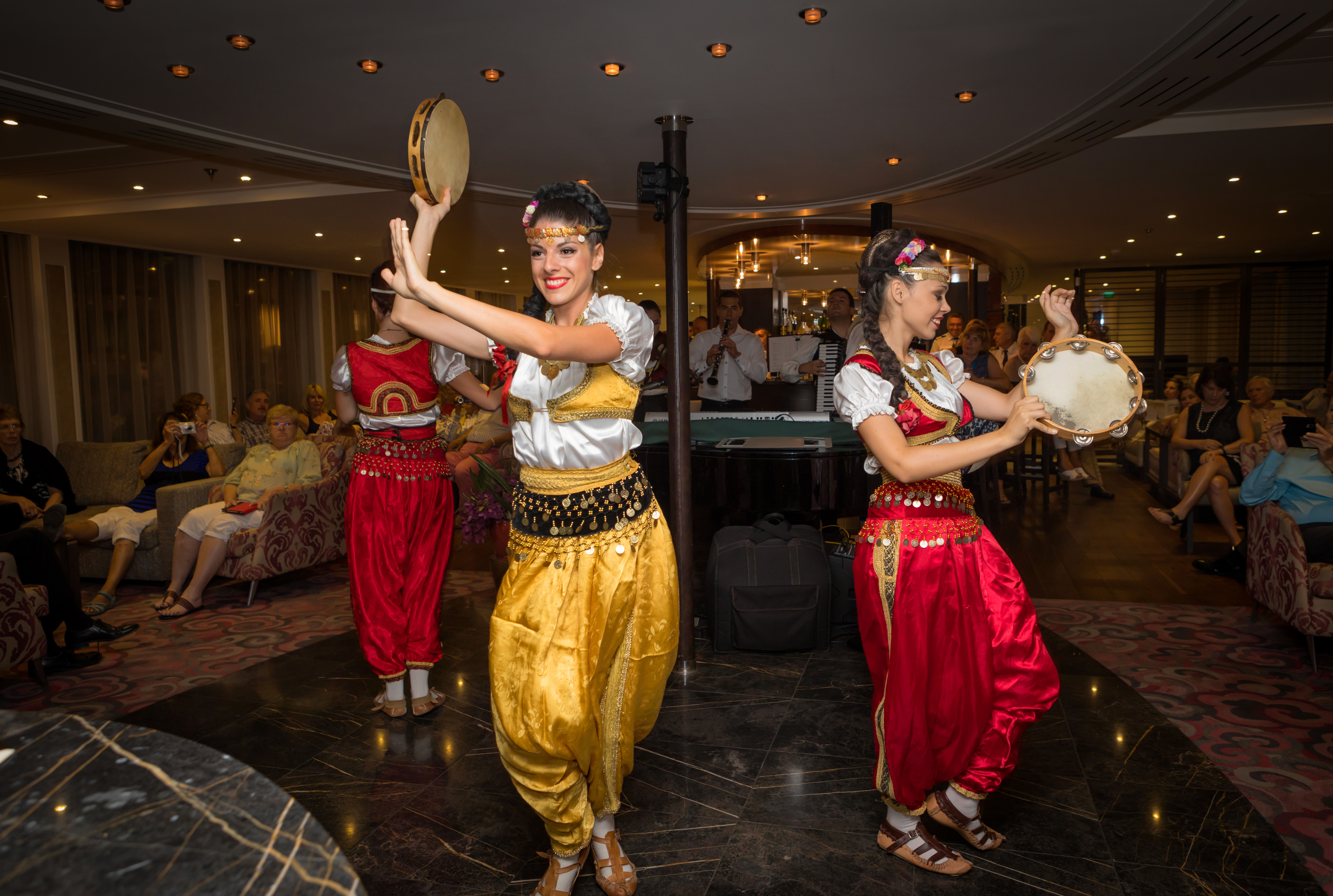
Whether it’s traditional Bavarian music, a local quartet or modern piano favorites, there is an eclectic schedule of entertainment on board.
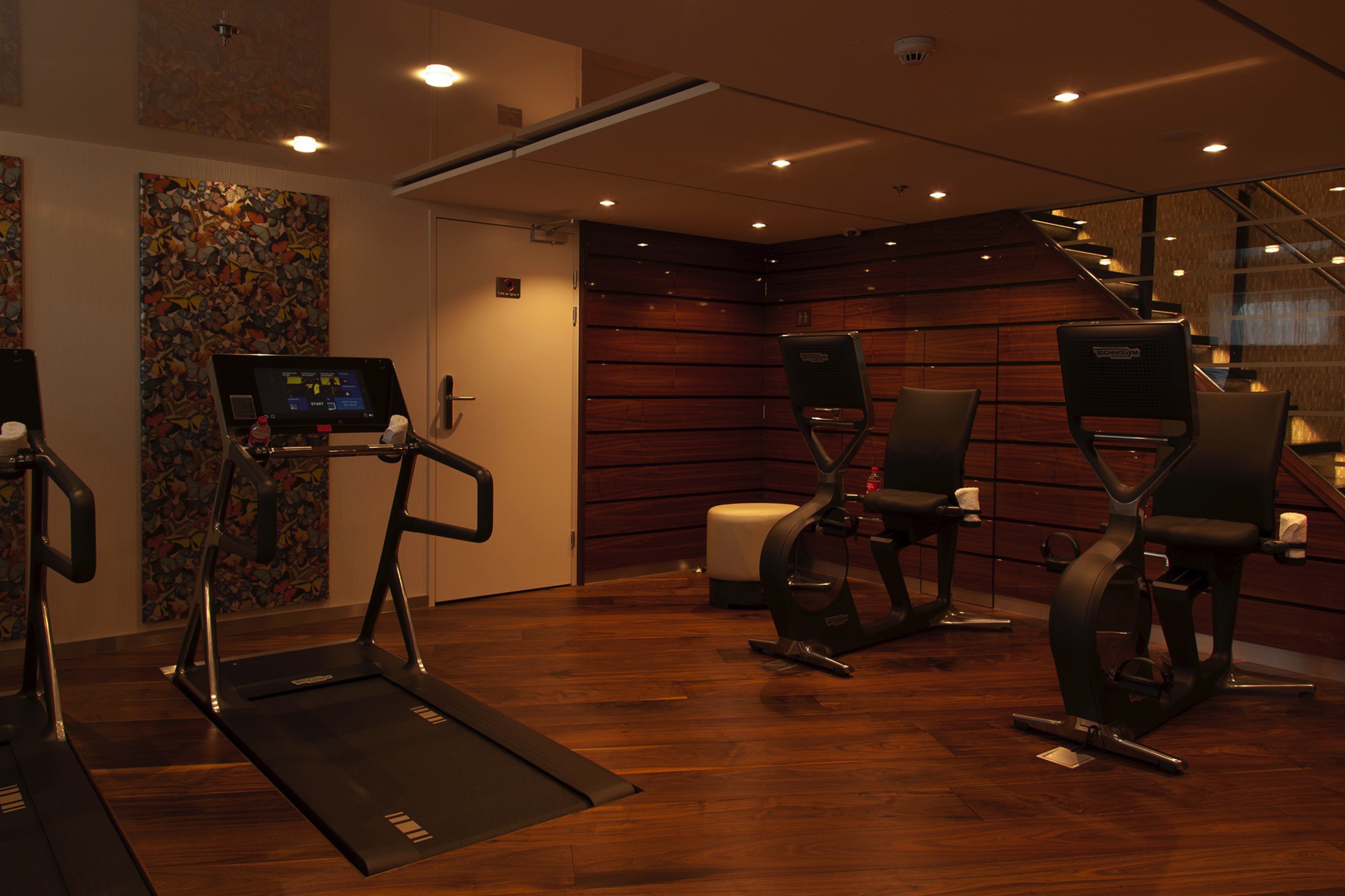
Are you looking for a way to stay fit on vacation? Hit the treadmill or lift some weights while cruising from one destination to the next.
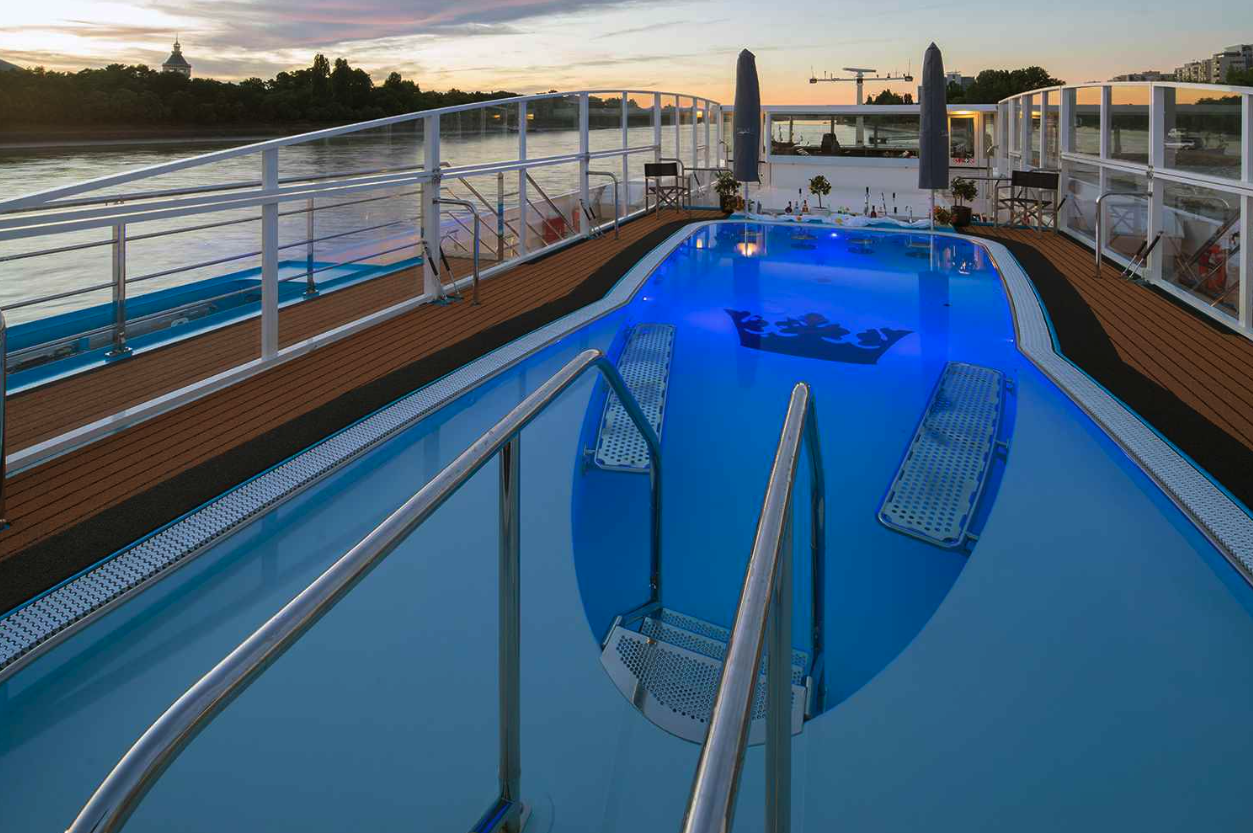
Soak up some rays or take a dip in our refreshing pool with a swim-up bar as we pass by centuries-old castles, charming villages and other breathtaking scenery.
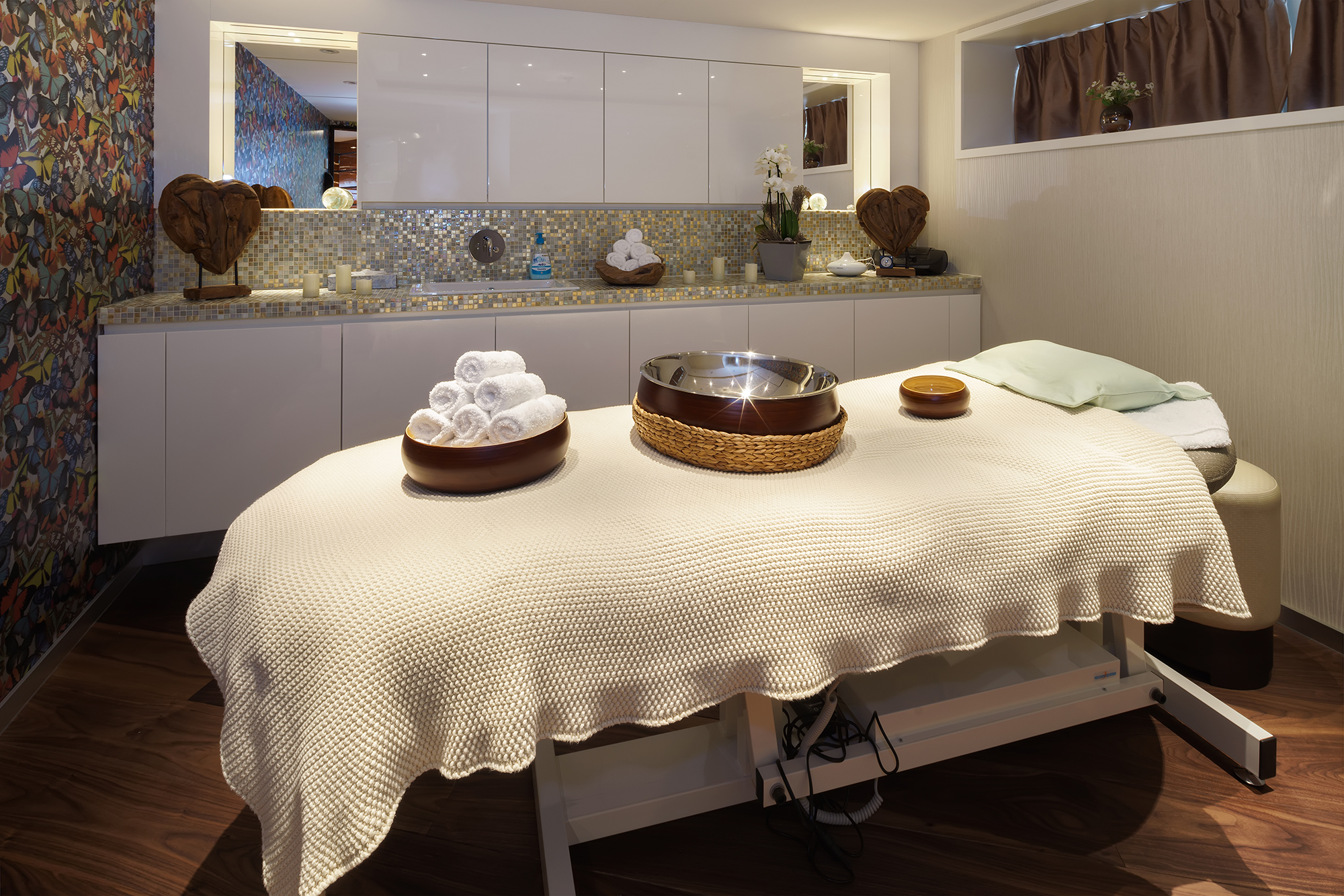
After a marvellous day of immersive shore excursions, return to the ship and treat yourself to a bit of pampering with a soothing massage.
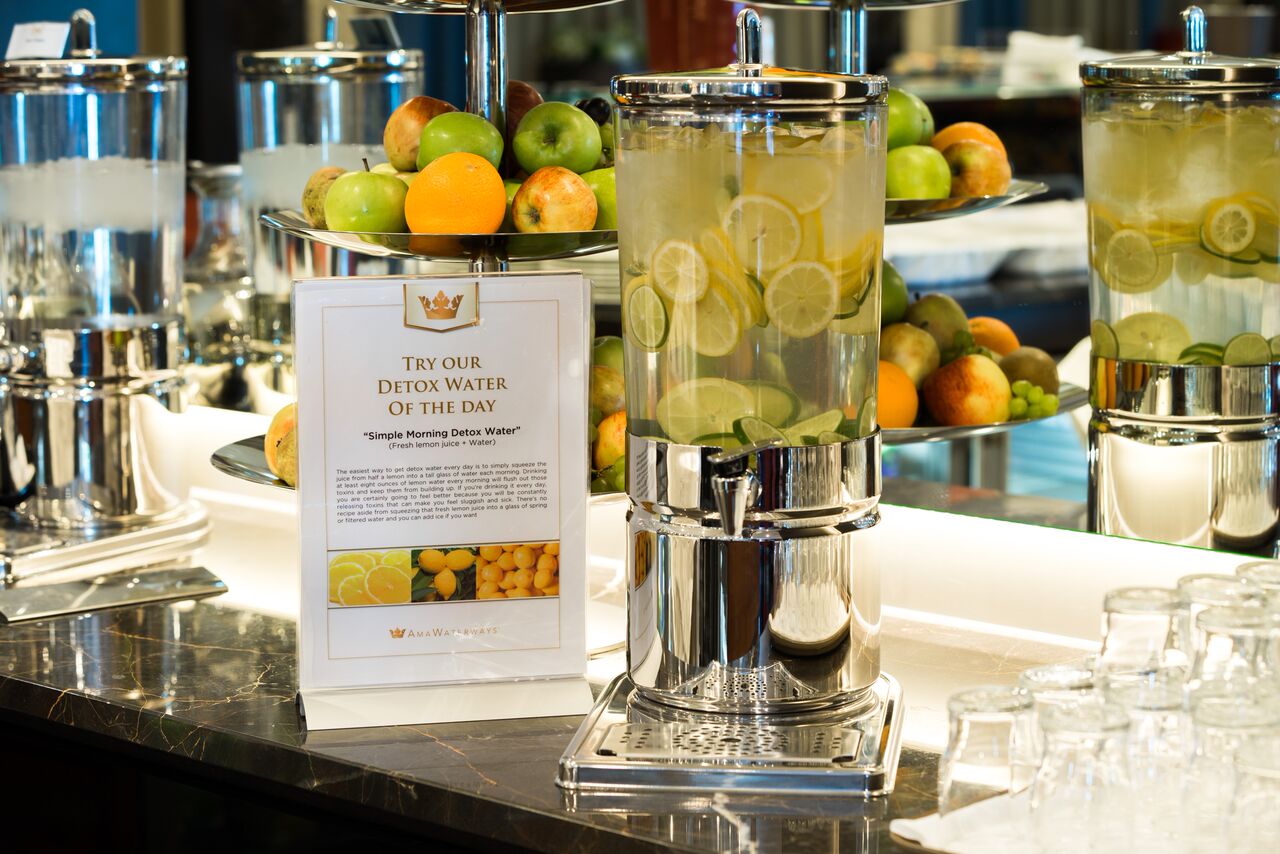
Lighter options are always available during meals as well as gluten free, vegetarian and low-sodium options. Discover the infused detox and gemstone water at our Hydration Station.
Effective immediately, AmaWaterways will only be welcoming guests fully vaccinated against Covid-19 on board its ships. This vaccination requirement also applies to accompanied minors. Guests affected by this decision should contact their travel advisor for options to reschedule their river cruise.
On our programs in Europe and Southeast Asia, children under the age of 4 years old are not permitted on board and children 4-7 years old are not recommended. On our Africa safaris program, due to safety precautions, there is a minimum age limit of 12 years old, unless otherwise agreed upon by AmaWaterways. All guests under the age of 18 are to be in a stateroom with an adult, and must remain supervised at all times, as their safety is the responsibility of the accompanying adult(s). Children between the ages of 4 and 10 at the time of embarkation may share a stateroom with 2 adults provided the child is able to share the bed with the adults – no additional bed will be provided. Select ships offer a limited number of staterooms with a fold-out sofa for a triple occupant; we would be happy to guide you through these options when available. A triple occupancy rate will apply for the child sharing the stateroom; pricing can be provided upon request. Please be aware that balcony staterooms of any kind may be unsafe for small children if left unsupervised. AmaWaterways does not provide child-specific programs or child-minding facilities. Please reach out to us if you have any further questions regarding our child policy.
As of March 3, 2022, children 5 and older at time of sailing are still required to be vaccinated however, children that are not yet eligible for the vaccine are able to come onboard if they can provide a negative PCT test taken within 72 hours of embarkation.
Reasonable efforts are made to accommodate the special needs of disabled cruise participants, but no responsibility will be undertaken for any denial of services by carriers, hotels, restaurants, or other independent suppliers. Tour buses are not equipped with wheelchair ramps and cabin doors are not wide enough to allow access by standard wheelchairs.
Wheelchairs and walkers cannot be carried on tour buses, due to space limitations. Wheelchair passengers should be aware of these limitations. For safety reasons, passengers in wheelchairs cannot be carried on ramps in ports where the ship is at anchor. We regret that we cannot provide individual assistance to a tour member for walking, getting on/off tour busses and other transportation vehicles, or other personal needs. A qualified travel companion must accompany travellers who need assistance.
Smoking is not permitted anywhere inside any of the ships. Smoking is only permitted on the Sun Deck. For the safety and comfort of all passengers on board, your cooperation in observing the no-smoking policy is greatly appreciated.
Please advise your Travel Agent or call us directly to advise if you have any dietary restrictions or allergies prior to embarkation. In most cases, we will do our best to accommodate special dietary requests and food allergies, but with one exception: Kosher. This diet has specific rules regarding food and its preparation and the shipboard environment does have limitations that prevent us from being able to adequately cater to this dietary need. Please note, though we can provide options to accommodate food allergies and sensitivities, we cannot guarantee there will not be any cross-contamination.
Comfortable, layered clothing adaptable to changing weather conditions is always advisable for daytime excursions. For the evening, “Casually elegant” attire is recommend and you may want to pack something a little dressier for the Captain’s night/Farewell Dinner – similar to how one would dress to dine at a 5-star restaurant. Comfortable shoes are recommended for excursions and workout clothing if you plan to take part in any wellness activities, active tours or use the onboard gym. Depending on the time of year, clothing that can be layered is highly recommended.
Europe: There are no medical facilities on board. However medical services can easily be called from shore if required.
Vietnam & Cambodia: We do not employ doctors or nurses on board the ships. In the event medical assistance is needed, appropriate medical facilities will be contacted. Note that response time can vary.
Africa: We do not employ doctors or nurses on board the Zambezi Queen. In the event medical assistance is needed, appropriate medical facilities will be contacted. Note that response time can vary.
Europe: High-speed Internet service is available free of charge as part of the in-stateroom “Entertainment-On-Demand.” Additionally, AmaWaterways offers complimentary Wi-Fi throughout the ship.
Vietnam and Cambodia: Free Internet and Wi-Fi in the lounge with computer stations.
Africa: Free Wi Fi is available but may be limited and sporadic during certain times of the day due to the ships isolated location.

- Lower Sun Deck
- Navigation Bridge
- Bicycles
- Heated Pool
- Sun Deck
- Walking Track

- Al Fresco Terrace
- Observation Lounge
- Main Lounge & Bar
- Gift Shop
- Reception
- The Chefs Table Restaurant
- Elevator
- Suite Staterooms
- CAT AA Staterooms
- CAT BA Staterooms
- CAT CA Staterooms
- CAT CB Staterooms

- Main Restaurant
- Elevator
- CAT AB Staterooms
- CAT BB Staterooms
- CAT CA Staterooms

- Massage & Hair Salon
- Fitness Room
- CAT D Staterooms
- CAT E Staterooms
- Crew Cabins

